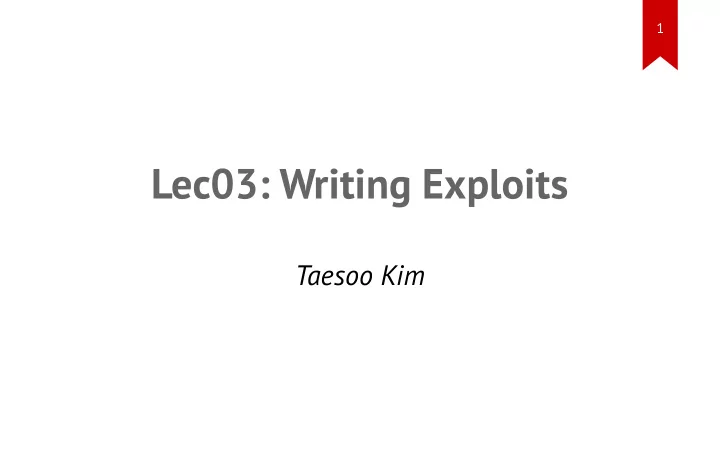

1 Lec03: Writing Exploits Taesoo Kim
2 Scoreboard
3 Administrivia • Survey: how many hours did you spend? (<3h, 6h, 10h, >20h) • Join Piazza! • An optional recitation on every Wed • 5:00-6:00pm (in Klaus 1447) • 6:00-6:30pm ( in Klaus 3126 ) • Lab03: NSA Codebreaker Challenge • Lab04: stack overflow is released! • Due : Both, Sept 22 at midnight
4 NSA Codebreaker Challenges
5 NSA Codebreaker Challenges “ The NSA Codebreaker Challenge provides students with a hands-on opportunity to develop their reverse-engineering / low-level code analysis skills while working on a realistic problem set centered around the NSA's mission .
6 NSA Codebreaker Mission “ Terrorists have recently developed a new type of remotely controlled Improvised Explosive Device (IED), making it harder for the U.S. Armed Forces to detect and ultimately prevent roadside bomb attacks against troops deployed overseas. The National Security Agency (NSA), in accordance with its support to military operations mission, has been asked to develop capabilities for use against this new threat. This will consist of six tasks of increasing difficulty, with the ultimate goals of being able to disarm the IEDs remotely and permanently render them inoperable without the risk of civilian casualties.
7 NSA Codebreaker Challenges Tasks • Task 1: Compute a hash and identify IED network ports • Task 2: Refine IED network traffic signature • Task 3: Decrypt IED key file • Task 4: Disarm an IED with the key • Task 5: Disarm any IED without a key • Task 6: Permanently disable any IED Submit your links as flags provided after the completion of each task.
8 Best Write-ups for Lab02 • aepifano@gatech.edu • jinho.jung@gatech.edu
9 Bomb Stats • Bombs exploded ?? times in total? • in ?? phases? • ?? people exploded at least once?
10 Bomb Stats • Bombs exploded 29 times in total (29 x -5 = -145 pts) • in ALL phases! • 13 people exploded at least once! • Each lab: 12/2/2/3 people • Each lab: 21/3/2/3 times
11 Min shellcode • 2000 bytes? 1000 bytes? 500 bytes? 100 bytes?
12 Min shellcode • 6-byte: hirva1093@gatech.edu • 6-byte: kcarpenter33@gatech.edu
13 Discussion 0 1. How different is the bomb binary this time?
14 Discussion 1 1. How did you start exploring the "bomb" (no symbol)?
15 DEMO • How to break at the entry point? (idea?) • PEDA: find "Boom" • Address translation to find xreferences
16 Discussion 2 (phase 1) 1. What's going on the first phase?
17 DEMO • Check: /proc/self/status • Binary patching: callq → nop (0x90) • Attach to the gdb (-p)
18 Discussion 3 (phase 2) 1. What's going on the second phase? • Did you find the main() function (i.e., dispatcher?)
19 Discussion 3 (obfuscation) $ x/10i 0x555555555952 0x555555555952: lea rsp,[rsp-0x1028] 0x55555555595a: or QWORD PTR [rsp],0x0 0x55555555595f: lea rsp,[rsp+0x1020] 0x555555555967: jmp 0x55555555596a 0x555555555969: jmp 0x555555549b56 0x55555555596e: dec DWORD PTR [rax-0x7d] 0x555555555971: (bad) 0x555555555972: or bl,al
20 Discussion 3 (when tracing) 0x555555555952: lea rsp,[rsp-0x1028] 0x55555555595a: or QWORD PTR [rsp],0x0 0x55555555595f: lea rsp,[rsp+0x1020] -> 0x555555555967: jmp 0x55555555596a | 0x555555555969: jmp 0x555555549b56 | 0x55555555596e: dec DWORD PTR [rax-0x7d] | 0x555555555971: (bad) | 0x555555555972: or bl,al +-> 0x55555555596a: call 0x5555555558b0 0x55555555596f: add rsp,0x8 0x555555555973: ret 0x555555555974: push rbp
21 Discussion 4 (phase 3) 1. What's going on the third phase?
22 Discussion 4 (phase 3) int count = 0; void progress_bar(int signo) { if (count != 0) printf("\b\b\b\b"); printf("| %02d%%", count); count += 2; } phase() { signal(SIGTRAP, progress_bar); for (int i = 0; i < 50; i ++) { ... __asm__ volatile("int3"); } }
23 Discussion 5 (phase 4) 1. What's going on the last phase? (nothing special!)
24 32/64 Shellcode 1. int $80 vs. syscall $ man syscall
25 What's about poly shellcode? 1. What's your general idea?
26 Dispatching routine +-------------+ | v [dispatcher][x86 ][x86_64 ] e.g., 0x40 0x90 - x86 inc eax - x86_64 REX + nop x86 : [ * ][goto x86 shellcode] x86-64: [nop][ * ][goto x86_64 shellcode] arm : [nop][nop][ * ][goto arm shellcode] MIPS : [nop][nop][nop][ * ][goto MIPS shellcode]
27 Discussion 6 (shellcode ascii/min) 1. Wow, what are your tricks? 2. NOTE. can be as small as zero byte..
28 Lab04: Stack overflow (due in two weeks) • Finally! time to write real exploits (i.e., control hijacking) • TONS of interesting challenges! • e.g., lack-of-four, frobnicated, upside-down ..
29 Today's Tutorial • Example: hijacking crackme0x00! • A template exploit code • In-class tutorial • IDA (yeah!) • Extending the exploit template (python)
30 DEMO: IDA/crackme0x00 • IDA w/ crackme0x00 • exploit writing
31 crackme0x00 $ objdump -d crackme0x00 ... 8048414: 55 push %ebp 8048415: 89 e5 mov %esp,%ebp 8048417: 83 ec 28 sub $0x28,%esp +--- ebp top v [ ][fp][ra] |<--- 0x28 ------->|
32 crackme0x00 $ objdump -d crackme0x00 ... 8048448: 8d 45 e8 lea -0x18(%ebp),%eax 804844b: 89 44 24 04 mov %eax,0x4(%esp) 804844f: c7 04 24 8c 85 04 08 movl $0x804858c,(%esp) 8048456: e8 d5 fe ff ff call 8048330 <scanf@plt> |<-- 0x18-->|+--- ebp top v [ [~~~~> ] ][fp][ra] |<---- 0x28 ------->|
33 In-class Tutorial • Step 1: Install IDA (feel free to use from now) • Step 2: Play with your first exploit! $ git git@clone tc.gtisc.gatech.edu:seclab-pub cs6265 or $ git pull $ cd cs6265/lab03 $ ./init.sh $ cd tut $ cat README
34 References • IDA Demo • Phrack #49-14
Recommend
More recommend